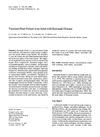 16 citations,
January 2010 in “Indian Journal of Dermatology, Venereology and Leprology”
16 citations,
January 2010 in “Indian Journal of Dermatology, Venereology and Leprology” Children with HIV often have skin problems that can indicate the severity of their immune system damage.
[object Object]  16 citations,
December 2001 in “Dermatologic Therapy”
16 citations,
December 2001 in “Dermatologic Therapy” Alopecia areata has a complex genetic basis that was not fully understood as of 2001.
 16 citations,
May 2000 in “Endocrinology”
16 citations,
May 2000 in “Endocrinology” A new gene, mrp4, is found in mice and may play a unique role in hair follicle development in tails and ears.
 14 citations,
April 2017 in “American Journal of Transplantation”
14 citations,
April 2017 in “American Journal of Transplantation” Skin problems from transplant drugs are common and need careful management in organ transplant patients.
 13 citations,
March 1986 in “Clinical Cardiology”
13 citations,
March 1986 in “Clinical Cardiology” An adult with Kawasaki disease experienced temporary heart failure but recovered without lasting heart damage.
 11 citations,
March 2013 in “Gene”
11 citations,
March 2013 in “Gene” A certain genetic variation in the IL1A gene may lower the risk of a hair loss condition in Chinese people.
 8 citations,
January 2012 in “Dermatology”
8 citations,
January 2012 in “Dermatology” The HPV vaccine may be linked to temporary hair loss in children, but the benefits outweigh the risks.
 3 citations,
September 2022 in “Frontiers in veterinary science”
3 citations,
September 2022 in “Frontiers in veterinary science” Melatonin affects cashmere growth in goats by influencing stem cell and certain signaling pathways.
 3 citations,
January 2010 in “Actas Dermo-Sifiliográficas”
3 citations,
January 2010 in “Actas Dermo-Sifiliográficas” Immunization and throat bacteria may increase the risk of a hair loss condition called alopecia areata.
 1 citations,
January 2023 in “In vivo/In Vivo”
1 citations,
January 2023 in “In vivo/In Vivo” Box A of HMGB1 can improve stem cell function, aiding anti-aging therapy.
 1 citations,
January 2010 in “Elsevier eBooks”
1 citations,
January 2010 in “Elsevier eBooks” Any drug can cause skin reactions, but antibiotics, NSAIDs, and psychotropic drugs are more common, with some reactions being life-threatening.
 1 citations,
November 1995 in “Postgraduate medical journal”
1 citations,
November 1995 in “Postgraduate medical journal” A Saudi individual initially identified as a girl had a genetic disorder affecting gender development.
 September 2023 in “medRxiv (Cold Spring Harbor Laboratory)”
September 2023 in “medRxiv (Cold Spring Harbor Laboratory)” Long-COVID has diverse, long-term health impacts, especially in young people.
 November 2022 in “Journal of Education, Health and Sport”
November 2022 in “Journal of Education, Health and Sport” The skin's bacteria might influence the development of a hair loss condition called alopecia areata.
 January 2020 in “arXiv (Cornell University)”
January 2020 in “arXiv (Cornell University)” Some existing drugs and natural products might work against COVID-19 by targeting the virus's main protease.
 April 2018 in “bioRxiv (Cold Spring Harbor Laboratory)”
April 2018 in “bioRxiv (Cold Spring Harbor Laboratory)” A gene variant causes patched hair loss in mice, similar to alopecia areata in humans.
[object Object]  May 1991 in “Current problems in dermatology”
May 1991 in “Current problems in dermatology” Skin issues can indicate immune system problems.
18 citations,
June 2001 in “Journal of Investigative Dermatology” Adding a specific gene to skin cells can help treat skin disorders like psoriasis.
SLE should be considered in unexplained fevers, even in males.
44 citations,
October 2009 in “Journal of the American Academy of Dermatology” Topical bexarotene 1% gel might help regrow hair in alopecia areata and is generally safe.
5 citations,
October 2021 in “Clinical, cosmetic and investigational dermatology” Japanese patients with alopecia areata often have a higher BMI and consume more vitamin C, fruit, and retinol, which may affect their condition's development or severity.
 1 citations,
May 2023 in “Journal of neuroendocrinology”
1 citations,
May 2023 in “Journal of neuroendocrinology” DAVID syndrome is a condition with immune system and hormone deficiencies, needing early diagnosis to avoid serious complications.
 September 2023 in “JAAD case reports”
September 2023 in “JAAD case reports” A man developed oral hairy leukoplakia while on baricitinib, a medication for alopecia and arthritis, and doctors should watch for such side effects.
November 2016 in “Regenerative Medicine” In September 2016, there were major advancements and promising clinical trials in stem cell research and regenerative medicine.
The man likely has secondary syphilis affecting his nervous system.
215 citations,
November 2000 in “Journal of Investigative Dermatology” The system allows precise control of gene expression in mouse skin, useful for studying skin biology.
143 citations,
January 2007 in “The American Journal of Human Genetics” Certain genes on chromosomes 6, 10, 16, and 18 may increase the risk of alopecia areata.
119 citations,
December 2008 in “The journal of investigative dermatology/Journal of investigative dermatology” Nanoparticles can deliver vaccines through hair follicles, triggering immune responses and providing protection.
91 citations,
January 2010 in “Journal of Allergy and Clinical Immunology” NK cells play a role in skin diseases like eczema and psoriasis.
 73 citations,
April 2019 in “Experimental Dermatology”
73 citations,
April 2019 in “Experimental Dermatology” The scalp's microorganisms significantly affect hair health and disease.




















